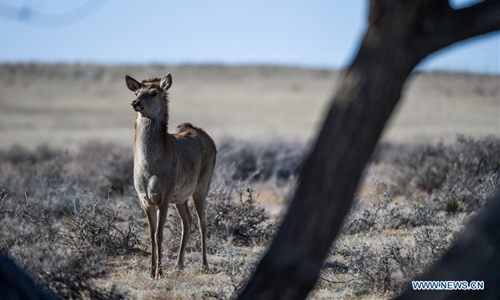
Photo taken on March 13, 2020 shows a red deer at a wildlife rescue station in Sunite Right Banner of Xilingol League, north China's Inner Mongolia Autonomous Region. In recent years, the Forest Public Security Bureau of Sunite Right Banner has strengthened its patrolling efforts and rescued many wild animals. (Xinhua/Ren Junchuan)
People who consume wildlife of national priority protection will be fined up to 20 times the value of the wildlife in South China's Guangdong Province, valid from Friday. At the same time, residents welcomed the new regulation as it's helpful to reduce public health risks.
Guangdong became the first Chinese province to revise its local regulation on wildlife protection on March 31, as a timely decision made by the provincial People's Congress to follow the national decision to ban wildlife trade after COVID-19 outbreak. On February 24, the Standing Committee of the National People's Congress, China's top legislative body, adopted a decision to thoroughly ban the illegal trading and consumption of wildlife as food.
Guangdong is one of the regions which heavily consumes wild animals, Guo Peng, director of the center for animal protection studies of Shandong University, told the Global Times on Friday. She said it's a good sign that the province took the lead to implement the ban on wildlife consumption.
The revised law's highlight is the consumption ban on wild animals. It also clarified the ban "reduces major public health risks," Guo said. Guo added that many specific items were included in the law, which is good for the rest of the country to follow. For instance, the topics include terrestrial spine wildlife that naturally grows and reproduce in the external environment, or any other wild animal which endangers public safety shall not be kept as pets, Guo noted.
The revised law will set up an excellent example for the country in banning illegal wildlife trade and consumption of wildlife, Guo said.
The residents living in Guangdong reached by the Global Times all agreed that the ban doesn't bring too much effect to their daily life.
A 39-year-old man surnamed Huang living in Guangzhou agreed that the revised law will stop wildlife hunting at its source as it forbids wildlife consumption.
"It might affect those restaurant owners who sell wildlife meat," a woman surnamed Wang in Guangzhou told the Global Times on Friday, adding that it's good that there are laws to abide by in the future.
The revised law is helpful to "remove people's die-hard habits of wildlife consumption," and effectively "reduce major public health risks," a 38-year-old English teacher named Rui Xiaota, living in Shenzhen, Guangdong, told the Global Times on Friday.
